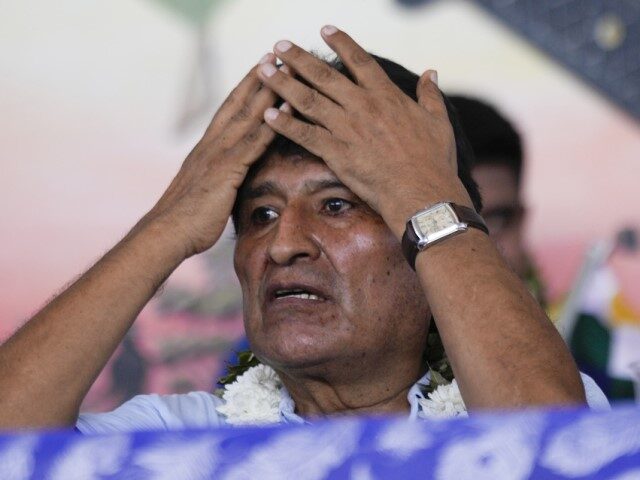Bolivian prosecutors on Monday formally charged socialist former president and suspected pedophile Evo Morales with aggravated human trafficking and requested an arrest warrant against him.
Morales, 65, is a failed socialist dictator who ruled Bolivia for four terms from 2006 to 2019, bypassing the two-term limit established by the Bolivian constitution through dubious court rulings. Morales is presently embroiled in a years-long power struggle against his former protegé, current socialist President Luis Arce, over control of Bolivia. Despite being term-limited, Morales insists that he will run for President again in 2025.
In recent months, local prosecutors reactivated an investigation against Morales on accusations of human trafficking and statutory rape allegedly committed over the course of his presidency. The investigation was originally launched in 2019 but remained “frozen” until September of this year.
Local authorities found evidence in the southern city of Tarija that indicated Morales had a sexual relationship with a 15-year-old girl identified as Cindy Vargas in 2016. Vargas gave birth to a child at a time when she was 16. Authorities recently found a birth certificate in Tarija listing Morales as the father of Vargas’ child.
Tarija prosecutor Sandra Gutiérrez explained that the formal charges and arrest warrant were presented in response to Morales’ refusal to attend a summons and testify as part of the ongoing investigation. Additionally, an arrest warrant was issued against Idelsa Pozo Saavedra, Vargas’ mother, who is also being investigated for allegedly “handing over” Vargas to Morales and allowing the sexual relationship to happen in exchange for political and other benefits. Vargas’ father remains in preemptive detention since October.
“Today [Monday] the formal indictment for the crime of human trafficking has been presented,” Gutiérrez told local reporters. “There is and has been an arrest warrant for these two people because they failed to appear the day they were summoned.”
Gutiérrez added that a migration alert was also activated against Morales and Pozo Saavedra to prevent them from leaving the country.
“The detention of both is being requested because there is a risk of flight, of obstruction and others that, in due time, in the hearing, we will substantiate, such as all the facts, indications and accumulated evidence,” the prosecutor said. “We have also activated the migratory alert, taking into account the ease with which they could flee.”
Since the reopening of the investigation, Morales “bunkered” himself in Chapare, a rural province located in the central Bolivian region of Cochabamba — widely considered to be his “political bastion.” Morales reportedly remains under the constant protection of “at least 500 individuals” at all times.
Morales immediately responded to the accusations by ordering his sympathizers to erect violent blockades across the nation’s main roads in October. The blockades, which lasted over three weeks, caused significant losses to Bolivia’s economy, leading to widespread starvation and shortages of other essential supplies. The violent protesters responded to law enforcement’s efforts to dismantle the blockades by attacking police officers with stones and dynamite.
Cindy Vargas, Morales’ alleged rape and trafficking victim, has been missing — along with her eight-year-old child — since October. Vargas and the child were last seen in the evening hours of October 2 in the vicinity of a school located in the municipality of Yacuiba, where the child was enrolled. According to the ongoing investigations, Vargas’ parents enrolled her in a pro-Morales youth organization created in the mid-2010s and made up of teenagers aged 14-15.
According to Gutiérrez, Morales was first indicted in mid-October, but police officers could not comply with the arrest warrant at the time, justifying the lack of compliance through “countless” reports. The prosecutor pointed out that some of the police reports state that Morales provided a false address to authorities and was not present in any of the other possible domiciles or locations where he could be found.
Another report, Gutiérrez explained, stated that the arrest could not be carried out due to the violent road blockades erected by pro-Morales loyalists.
Morales’ lawyer, Wilfredo Chávez, reportedly affirmed that the socialist former president was “not notified” of the indictment and questioned prosecutor Gutiérrez’s actions.
“The only thing I know is that he [Morales] was not notified and what I was seeing now is that the same Prosecutor’s Office recognizes that they have not notified supposedly because of the blockades, which have ceased more than a month ago,” Chávez reportedly said.
Christian K. Caruzo is a Venezuelan writer and documents life under socialism. You can follow him on Twitter here

COMMENTS
Please let us know if you're having issues with commenting.